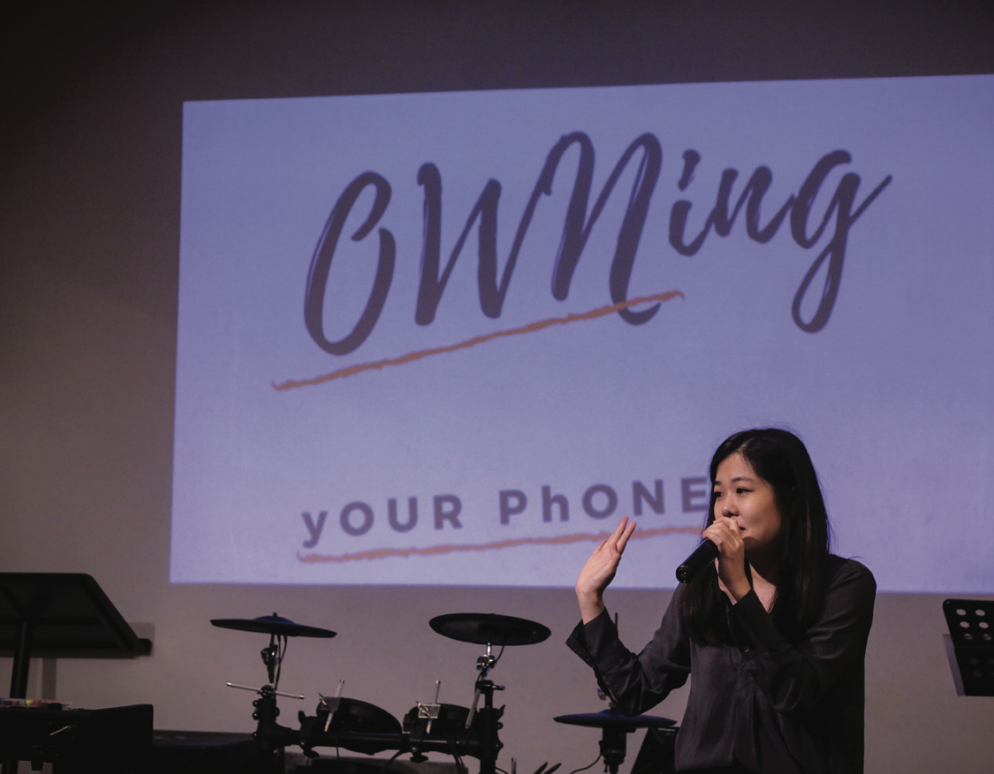美佳之窗 His Window 87( Jul - Sep 2019 )
Text by Cheah Mun Wei
When I was tasked to conduct an interview with teens in light of this magazine issue’s subject on ‘Christians and their media devices’, I thought why not gather an intimate focus group from our church and have a little chat with them. From their attitude towards owning a smartphone, to the latest internet trends that attracts their interests, this is a great opportunity for us to tap into their world of media device usage and bridge the gap! So I conducted a workshop with the Mega Jesus Youth Fellowship (MJYF) to discuss this subject.
Teens VS Media Device Usage
Only 2 out of the 56 teens aged between 13-17 do not own a smartphone, reason being their parents opposed to it. A student even pointed out to me that she owned her first phone at the young age of 4.
When asked about the need of a smartphone in their lives, the expected quick responses points to largely social media and communications apps (Instagram, Facebook, WhatsApp, WeChat. etc), followed by entertainment and gaming apps (Youtube, Spotify, PUBG, Mobile Legends....etc). In comparison, when put in a scenario without data or access to internet, apart from making phone calls the other functions such as calculator, clock, calendar are mostly doable without the desperate need to own a smartphone.
 Do Not Let Your Phone ‘OWN’ Your Life.
Do Not Let Your Phone ‘OWN’ Your Life.
How is your phone ‘Owning’ your time?
Undeniably, with the cutting edge technology we often hail the convenience and multitasking ability as the biggest benefits that comes with these handheld devices. But do we really have more free time as a result of it?
Instant access to the internet helps our students with accomplishing their school assignments and gain more knowledge they wouldn’t have time to explore in classrooms. However without the awareness of proper time management, we find the risk of these teens scrolling away on their phones aimlessly.
A few simple taps allow us to check the amount of time spent on our devices and some even present a precise breakdown on how much time is spent on what apps. To a few, it may have come as a surprise when they find out their freed up time is actually spent mostly entertaining rather than educating themselves. I guess the question left to be pondered here is not how much time we can save from using our phones but how do we spend this time?
 Create a Safe and Open Environment to Share.
Create a Safe and Open Environment to Share.
How is your phone ‘Owning’ your interpersonal relationships?
As we weigh into the pros and cons of using smartphones as a means for relationship building and communication, I was quite taken aback as they voiced out a few risks that comes with the instantaneous accessibility to various social media apps.
Even though presented with the risks such as identity theft, privacy invasion, cyber bullying, many would still choose to nonchalantly wave it off just because everyone else is doing the same thing. As we enjoy the ease of manoeuvring between different social media connecting to different people in life, we might slowly become insensitive and blur the lines to our virtual presence and our physical presence.
For example, we might see a buzz sharing the latest social media trends or gaming hacks. No doubt these are great conversation starters to break the ice and get connected, but is that all we can talk about? Do we catch ourselves habitually scrolling away on our phones trying to avoid the awkwardness of not having more to say? Likewise, our daily behaviour could be influenced by the internet culture where we are chained to our phone, easily distracted by the app notification in fear of missing an update, or responding with short lukewarm words just as we would in some social media apps.
How to be better Owners of your phone?
As I mull over the best closure to this workshop, I realized it’ll be an unending debate on the appropriate age and circumstances to own a smartphone or media device in today’s world. How I wished there is an eleventh commandment saying ‘thou shall not use your phone’ sort of instruction from God found in the bible!
Does that mean modern day church or Christianity is losing its relevance to our young congregation? I humbly disagree!
Presenting a smartphone or media device with internet access is like presenting our teens with access to uncharted waters, promising them with a gain in limitless knowledge and much accomplishments. How can the church family encourage and inspire our younger generation to be responsible and better owners of these powerful devices?
 Raise Awareness to Build Confidence and Better Discernment.
Raise Awareness to Build Confidence and Better Discernment.
Awareness and Accountability
As we reflect upon 1 Corinthians 10: 23-24
“You say, “I am allowed to do anything”—but not everything is good for you.
You say, “I am allowed to do anything”—but not everything is beneficial.
Don’t be concerned for your own good but for the good of others.”
Instead of fearfully hiding and shielding our younger generations from the future technological advances, we could create a safe and open space for them to share their thoughts and doubts. Increasing their self-awareness helps them discern beneficial and destructive habits when using their devices. Encouraging voluntary accountability to authoritative figure such as parents, teachers, pastors or church leaders will also build their integrity and confidence when faced with tempting situations that’ll steer them away from their faith while using these media devices.
Global businesses are caught up in the fast pace of unveiling the latest technology media devices in the name of advancing human race to the next level, but let us not prioritize these over really connecting with our Creator who enabled all these in the first place.
